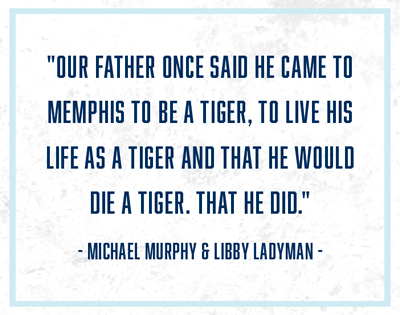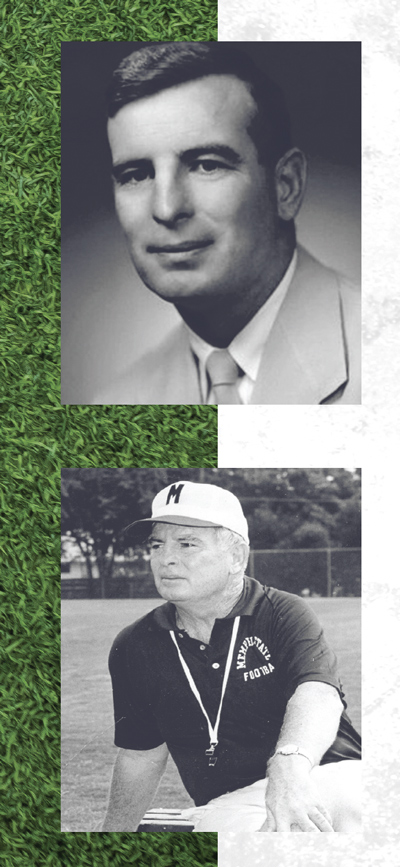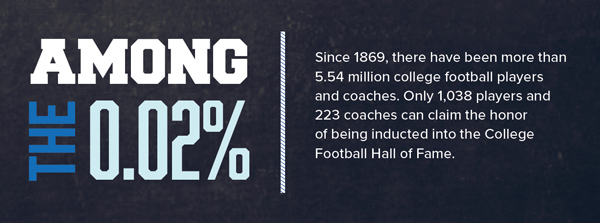UofM Magazine
Billy J. Murphy is officially joining one of the most exclusive clubs in college athletics. On Dec. 6, 2022, the former University of Memphis football coach and athletic director will be inducted posthumously into the College Football Hall of Fame as part of the 2022 class.
Murphy’s 91 wins over 14 seasons as head football coach of the Tigers (1958-71) are 32 more than any other coach in program history. His teams posted winning records in 12 of his 14 seasons. From 1960-63, the Tigers compiled a 33-5-1 (.859) overall record, which remains the highest winning percentage over any four-year stretch in school history.
In 1966, Murphy added athletic director to his list of duties at the University. He served in that role for 16 years, including an additional 10 after he had stepped away as football coach.
Murphy was married to the late Elizabeth Parrish and the couple had two children, son Michael and daughter Libby. He passed away on Feb. 21, 2008, at the age of 87.
 “Our family is humbled and honored, as our father would be, at the news of his induction
into the College Football Hall of Fame,” said his children Michael Murphy and Libby
Ladyman. “Our father was not only a great coach but a great man. He loved the University
of Memphis, his players, coaches, colleagues, staff and the entire Tiger community.
Memphis gave our father his first head coaching job, and he returned their confidence
with his loyalty and dedication to the program. Our father once said he came to Memphis
to be a Tiger, to live his life as a Tiger and that he would die a Tiger. That he
did. Well-deserved, old soldier. God bless you.”
“Our family is humbled and honored, as our father would be, at the news of his induction
into the College Football Hall of Fame,” said his children Michael Murphy and Libby
Ladyman. “Our father was not only a great coach but a great man. He loved the University
of Memphis, his players, coaches, colleagues, staff and the entire Tiger community.
Memphis gave our father his first head coaching job, and he returned their confidence
with his loyalty and dedication to the program. Our father once said he came to Memphis
to be a Tiger, to live his life as a Tiger and that he would die a Tiger. That he
did. Well-deserved, old soldier. God bless you.”
Murphy joins Allyn McKeen, the Memphis head coach from 1937-38, as the only player or coach from the University in the College Football Hall of Fame. He is among 18 players and three coaches in the 2022 class who were selected from the national ballot of 78 players and seven coaches from the Football Bowl Subdivision.
“We know that Memphians everywhere will be proud of the legacy earned by Coach Murphy as a football player, coach, administrator and leader,” said Memphis vice president and director of intercollegiate athletics Laird Veatch. “I have heard multiple stories from former players, fans and Coach Murphy's family about the incredible and lasting impact he made on so many Tigers in the Memphis community. We are thankful to Archie Manning and all of the College Football Hall of Fame selection committee for recognizing one of the greatest Tigers of all time in this special and deserving way.”
 Taking over as head coach in 1958, Murphy guided then-Memphis State to a 91-44-1 record
while regularly playing against some of the nation’s top competition. He led the program’s
transition to major college status as a member of the NCAA University Division in
1960, finishing 8-2 in the first season at college football’s highest level.
Taking over as head coach in 1958, Murphy guided then-Memphis State to a 91-44-1 record
while regularly playing against some of the nation’s top competition. He led the program’s
transition to major college status as a member of the NCAA University Division in
1960, finishing 8-2 in the first season at college football’s highest level.
As the Tigers' program grew in stature, Murphy replaced small-college opponents with major programs. In 1962, Murphy led the Tigers to their first win over a member of the Southeastern Conference, a 28-7 victory at Mississippi State. In addition to the Bulldogs, his career includes wins over Florida State, Houston, Miami (Fla.), Ole Miss, South Carolina, Virginia Tech and Wake Forest.
The 1963 season is among the most notable in Memphis history as the Tigers went 9-0-1, the school’s first and only undefeated season since 1938. Murphy was named National Coach of the Year by the Detroit Times while running back Dave Casinelli claimed the NCAA rushing title and the defense posted five shutouts. The team finished No. 14 in the UPI Coaches Poll, which remains the highest final ranking in school history.
That season, the Tigers held No. 2 Ole Miss to a 0-0 tie at Crump Stadium in Memphis. Ole Miss, coached by fellow College Football Hall of Fame member Johnny Vaught, had gone 10-0 and won the SEC and the Sugar Bowl the previous season. It was the first time the Rebels had been held scoreless in 47 games. Four seasons later in 1967, the Tigers defeated Vaught and the Rebels 27-17 to claim the program’s first win over Ole Miss in the 22 games of the series.
Murphy guided the program into the Missouri Valley Conference in 1968 after 27 years as a college football independent. In three of the first four years in the conference, Murphy led the Tigers to a conference championship and was named Missouri Valley Coach of the Year.
The final game of Murphy’s career as a head coach was the Tigers’ first victory in a major bowl game, as they defeated San Jose State 28-9 in the 1971 Pasadena Bowl.

“We are thrilled to hear about the tremendous honor for Coach Murphy and his family,” said current UofM head football coach Ryan Silverfield. “Coach Murphy was an unbelievable leader, mentor and role model not only for the University of Memphis but for the city and the entire Mid-South region. I'm thrilled that he and his family are getting the recognition they so richly deserve.”
Murphy grew up in Siloam Springs, Arkansas, and was an All-SEC tailback at Mississippi State where he played under McKeen who had left the UofM for Starkville in 1939. After playing two seasons at Mississippi State, Murphy joined the Marine Corps Reserve in 1943 and transferred to Duke University for training with the V-12 Program. He served heroically during World War II in the South Pacific, narrowly escaping with his life on at least four occasions and receiving the Bronze Star, the Presidential Citation and the Navy Citation. Following the war, Murphy returned to Mississippi State as the captain of the 1946 Bulldogs team.
After graduating from Mississippi State, Murphy took his first job as an assistant coach at Memphis in 1947 and spent five seasons coaching the backfield. In 1951, he returned to Mississippi State as an assistant under head coach Murray Warmath, who he followed to Minnesota in 1954 before becoming the Tigers’ head coach at the age of 37 in 1958.
Murphy is also a member of the State of Tennessee Sports Hall of Fame, the Mississippi State Hall of Fame and the Memphis M Club Hall of Fame. Each year, the Billy J. Murphy Award is presented to a former Memphis athlete who has excelled in their chosen profession after graduation, and the Tigers' practice facility is named in Murphy's honor.
